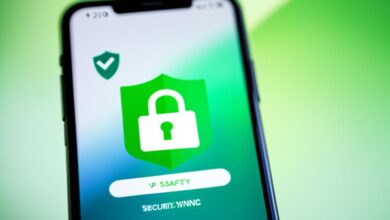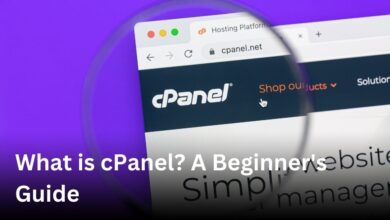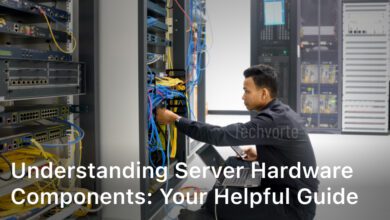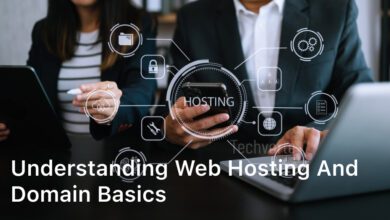A virtual private network (VPN) is key to keeping your online actions safe. It ensures your privacy is protected. We’ll learn about the core parts and steps that guard your digital trail.
With a VPN, online security and privacy get better. It does this by using encryption and tunneling. This method hides your IP address and secures your web activities. That way, your important data stays private.
We will dive into how VPNs function, covering protocol and encryption. We will also discuss the VPN server system. Additionally, we will explore the upsides and downsides of using a VPN. This will aid you in deciding if it’s the right pick for you.
What is a VPN?
A VPN is a tool that makes a safe connection between your device and the internet. It helps to keep your online activities private and secure. By hiding your IP address and encrypting your data, a VPN protects your digital privacy.
Definition and Purpose of a VPN
A VPN creates a private and secure path for your device to connect to the internet. This encrypted tunnel shields your online actions from others. It’s designed to keep your personal information safe and enhance your digital security.
Types of VPNs for Personal and Business Use
VPNs are used for different reasons by people and companies. Individuals use them to protect their privacy, overcome content restrictions, and secure public Wi-Fi. Businesses utilize VPNs to offer secure remote access, allowing employees to work safely from various places.
How Does a VPN Work?
A VPN (virtual private network) has several key parts that work together. It uses special methods and protocols to make a safe link between your gadget and the VPN’s server.
VPN Protocols and Encryption Methods
VPNs work by using protocols like OpenVPN and IPSec to build a safe path for your info. These protocols also decide how secure the link is. Strong encryption, often AES-256, helps keep what you do online private.
VPN Tunneling and Secure Connection Establishment
Connecting to a VPN makes your web surfing go through a safe tunnel. This tunnel hides your real IP address and makes tracking hard. The VPN app on your device keeps this connection secure, protecting your data as you browse.
VPN Client Software and Setup
To use a VPN, you need to put a VPN client app on your device. These apps make it easy to connect to the VPN and set your preferences. There are many vpn client software options, from NordVPN to Surfshark, to choose from.
Popular VPN Client Applications
NordVPN, ExpressVPN, Surfshark, Private Internet Access (PIA), and ProtonVPN are top choices. They make connecting to your vpn setup easy. They have cool features like picking the best server for you and keeping you safe online.
Step-by-Step Guide to Setting Up a VPN
Setting up a VPN is easy. Let’s go through it:
- Choose a good VPN service and sign up.
- Get the right VPN app for your device (like for Windows or iOS).
- Put the app on your device.
- Open it and log in.
- Choose a server or let the app pick one for you.
- Hit “Connect” to start your secure VPN.
- Now, you can browse the web safely and privately.
Following these steps helps you protect your online privacy and see content from all over the world.
VPN Servers and Infrastructure
A VPN’s network of servers is right at the heart of what it does. They are crucial for keeping your online activities private and for letting you visit various places online.
If you use a VPN, your internet goes through these servers. This makes your data safer and lets you view what’s online from different parts of the world.
Server Locations and Geographic Distribution
The variety of server locations a VPN offers is very important. With servers in many places, you can see and use online content from across the globe.
These servers also make sure the VPN works smoothly. They keep everything running fast and without problems. So, picking a VPN with lots of servers can give you a better online experience.
When choosing a VPN, look closely at where their servers are located. A good VPN will have many servers all around the world. This means you can get to online content easily and your connection will stay safe and stable, wherever you are online.
Benefits of Using a VPN
A VPN gives you lots of perks, like keeping your online stuff private and safe. It lets you look at things online that might normally be blocked for you. This makes having a VPN part of how you operate online super useful.
Online Privacy and Security
Using a VPN beefs up your privacy and security a lot. It scrambles your internet traffic and hides your IP address, keeping your private info from snoops. So, your chances of having your data stolen or privacy invaded drop significantly, which is really important when on public Wi-Fi or in potentially risky internet spots.
Access to Restricted Content
If something cool is blocked online where you are, a VPN can help. You see, it makes the internet think you’re in a different place, letting you view content not normally available. This means more shows, news, and social stuff for you to check out.
Secure Remote Access to Corporate Networks
For those working outside the office, a VPN’s a must. It creates a super safe connection to your company’s internet, protecting all your work info. Even on dodgy public networks, your data stays secure. It’s a big help for keeping work on track, wherever you are.
Limitations and Drawbacks of VPNs
Virtual private networks (VPNs) come with lots of pluses for online privacy, security, and access. But they also have some limitations and drawbacks to consider. Knowing these can help you pick the best option for your needs.
Potential Performance Impact
One issue with VPNs is how they affect your internet speed. When you use a VPN, your data is encrypted and sent through a VPN server. This can slow down how fast you download or upload stuff online. It might also make your online games and high-quality video streaming less smooth. This is known as the vpn performance impact.
Legal Restrictions in Certain Regions
In some places, VPNs face vpn legal restrictions. Governments have made laws against VPNs due to worries about security, censorship, and crime. So, if you’re in a region with such rules, using a VPN could lead to trouble or penalties.
Before using a VPN, it’s smart to check the rules and laws where you’ll be. This way, you can decide if a VPN is still the right choice for you. Researching the vpn limitations and vpn drawbacks in advance is key.
VPN Encryption and Security
A VPN keeps your online actions safe with its strong encryption and security methods. The quality of these vpn encryption and vpn protocols is vital. They make sure your data is kept private and safe.
Importance of Strong Encryption
Having good vpn encryption strength is key for a safe VPN service. Advanced encryption like AES-256 stops others from seeing your private info. This means your online chats and actions are safe, even from smart hackers.
Secure VPN Protocols and Best Practices
The vpn protocols a VPN uses are also important for security. Standards such as OpenVPN, IKEv2, and WireGuard are top choices. They mix strong security, fast speeds, and extra safety features well.
To make your vpn security even better, follow some tips. Update your VPN app often. Pick servers in places with good data laws. Be careful about what you do online when your VPN is on.
Focusing on good vpn encryption and vpn protocols means your online info is safe. This lets you browse the internet with less worry and more trust.
Choosing the Right VPN Provider
Choosing the right VPN provider is key for better protection and privacy online. You need to think about a few important things before you pick one.
Factors to Consider When Selecting a VPN Service
You should check out a VPN’s server network, its speeds, and what devices it works on. You also need to look into how easy it is to use. Make sure they have good security, use strong encryption, and don’t keep logs of your activity. This is to keep your online actions safe and private.
Evaluating VPN Providers’ Privacy Policies
The privacy policy of a VPN provider is very important. Choose one with a clear, detailed privacy policy that promises not to keep logs and protects your information. Make sure you read their policy to know how they protect your data and your privacy.
VPN Use Cases and Applications
VPNs are incredibly versatile and serve various needs. They are great for keeping personal privacy and security intact. They also let businesses and workers securely access information from remote locations. Additionally, they can help access content usually blocked in certain areas.
Personal Online Privacy and Security
For single users, a VPN means a lot. It hides their IP address and secures their internet use. This is critical against attacks like hacking and theft. It’s especially useful on public Wi-Fi and with personal data online.
Remote Access for Businesses and Remote Workers
For companies in today’s world, VPNs are a must. They let employees safely connect to the company’s network from anywhere. This secure connection protects business information and communications, keeping them private.
Accessing Geo-Restricted Content
VPNs help overcome content blocks or limitations based on location. When connected to a VPN server in a different area, users seem to be there. This grants them access to content and services not normally available in their region.
Common VPN Myths and Misconceptions
Many myths surround VPNs, keeping people from using them for online privacy and security. We will tackle some main worries about VPNs’ legality and how they work.
Addressing Concerns About VPN Legality
Some think VPNs are illegal or shady. But, in most countries like the U.S., using a VPN is okay, if done right. VPN legality depends on how you use it. They’re not illegal by themselves.
People, businesses, and governments use VPNs for better online safety. If you’re just trying to keep your info safe or see content you’re allowed to, don’t worry about the legality of VPNs.
Clarifying VPN Performance and Speed Impacts
It’s also believed that VPNs will make your internet slow and perform badly. While they can add a bit of delay for safety reasons, today’s VPNs are much faster than before.
Good VPN services have fast servers and smart ways to secure your data. Their impact on speed depends on server distance and the VPN’s quality.

Knowing the truth about these VPN myths helps you choose wisely for your online safety.
Conclusion
In the end, a virtual private network (VPN) greatly boosts our online safety. It does this by making our internet traffic unreadable and sending it through a safe path. This way, a VPN keeps our online identity hidden and our private data safe.
Whether we’re surfing online, watching shows, or working from home, a trusted VPN can make us feel secure. To pick the right VPN, it’s important to know how they work, the perks they offer, and what to look for. This helps us choose the one that meets our needs best.
As we tackle the changing scene of online privacy and safety, a VPN is a must-have. It empowers us to protect our digital presence, keep our important info secure, and have a safer, quieter online life.





